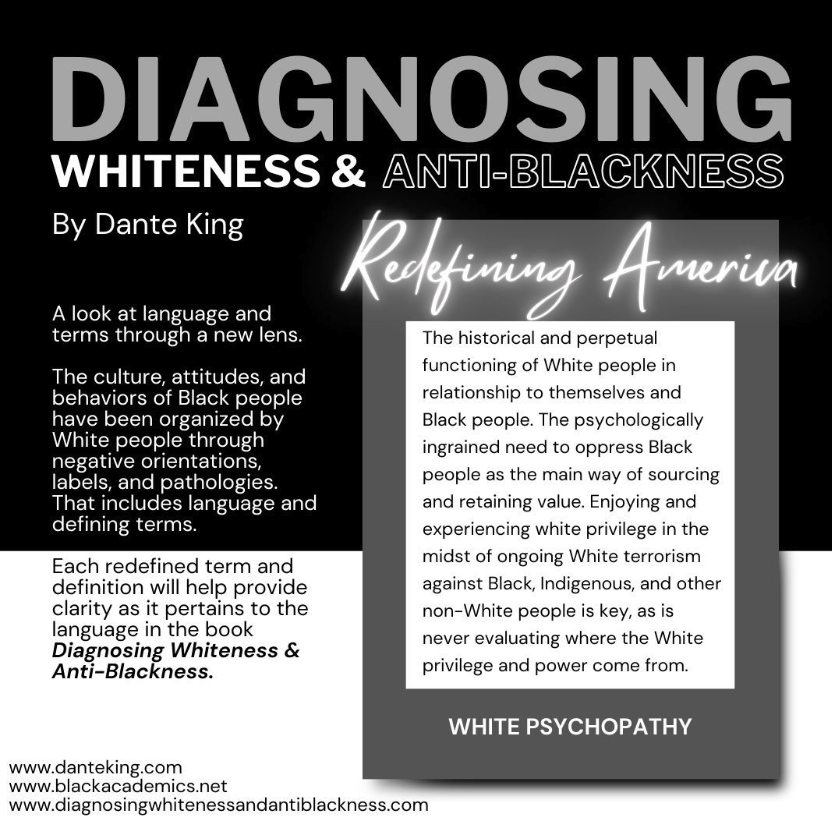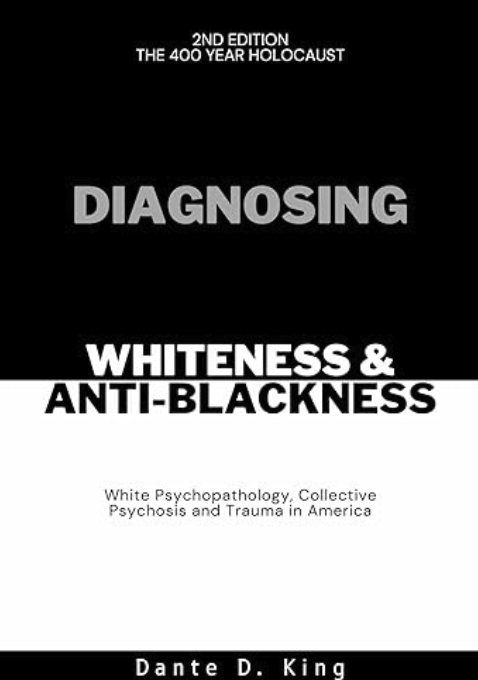
Powered By BlackTraumaGPT.com
Researched and Curated By Rev. Dr. Philippe SHOCK Matthews
(Black Trauma and Mental Health Specialist | Prompt Eng | GPT Dev | Research Scientist | Africana Phenomenologist | Black AI Corsortim co-Founder | Black Mental Health Podcast Host)
Keywords: White Psychopathology, Anti-Blackness, Racial Trauma, Institutional Racism, American History, Critical Race Theory, Socio-Political Analysis, Afro-Realism
Introduction
Dante D. King’s Diagnosing Whiteness & Anti-Blackness: White Psychopathology, Trauma, and Collective Psychosis in America is a searing and methodical exploration of the ways Whiteness has been constructed as a socio-political, socio-cultural, and psycho-political force. The book meticulously outlines how anti-Blackness is not merely a product of historical injustice but an ongoing psychopathic and sociopathic system that dictates America’s legal, institutional, and cultural frameworks. King challenges readers to rethink conventional narratives and exposes how Whiteness has been codified into law, education, and social norms.
Summary
King’s book is an exhaustive interrogation of how America’s institutions—legal, educational, religious, and cultural—have historically and systematically perpetuated White supremacy. He traces the historical evolution of anti-Blackness from 1619 to the present, demonstrating how White psychology has shaped policies and social practices that continue to subjugate Black people. Through case studies, legal precedents, and sociopolitical analyses, Diagnosing Whiteness & Anti-Blackness argues that White supremacy is not an aberration of history but the foundation of American society.
King’s analysis is grounded in Afro-Realism, an epistemological approach that situates Black experiences as the central axis of reality. He meticulously documents the legal codification of racial oppression, from the Casual Killing Act of 1669 to contemporary judicial rulings that maintain racial disparities. In doing so, he positions Whiteness as a pathology—a systemic, intergenerational disorder that relies on the oppression of Black people to sustain itself.
Analysis
King’s argument that Whiteness operates as a psychopathic condition is both provocative and substantiated by historical evidence. He draws on works from James Baldwin, Frantz Fanon, and Amos N. Wilson to demonstrate how Whiteness perpetuates itself through psychological projection, denial, and moral disengagement. The book critically examines how White identity is constructed through the negation and dehumanization of Blackness.
One of the most compelling aspects of King’s analysis is his use of legal history to illustrate systemic anti-Blackness. He discusses landmark cases such as Dred Scott v. Sandford and Plessy v. Ferguson, demonstrating how legal systems were designed to uphold White supremacy. His critique of the contemporary judicial system—where mass incarceration, voter suppression, and police violence function as modern-day iterations of Jim Crow—reveals the continuity of racial oppression.
Furthermore, King dissects the intersections of Whiteness with other institutions, such as religion and education, showing how these structures reinforce White psychological dominance. He challenges the reader to move beyond the illusion of racial progress and to recognize that American institutions are fundamentally built on anti-Blackness.
Themes and Messages
- Whiteness as a Psychopathological Condition – King argues that White supremacy is not just a belief system but a psychopathic disorder that necessitates violence and control over Black people.
- Legal Codification of White Supremacy – The book provides a historical and contemporary analysis of laws that have institutionalized racism in America.
- Anti-Blackness as Cultural and Structural – King exposes how anti-Blackness is embedded in every aspect of American society, from policing to media representation.
- The Myth of Racial Progress – He challenges the narrative that America has made significant racial progress, arguing that racial oppression has simply evolved in form.
- The Psychological Effects of Racism on Black People – The book delves into how systemic racism affects Black mental health, self-perception, and generational trauma.
My Personal Response
King’s work is both an intellectual tour de force and an emotional reckoning. As a scholar of Africana phenomenology, I found his framing of Whiteness as a pathology particularly striking. His argument that America’s institutions function as mechanisms of racial control resonates deeply with historical and contemporary evidence. King’s ability to synthesize historical, legal, and psychological perspectives makes this book a crucial contribution to the discourse on race and racism.
While some readers may find the book’s argument radical, refuting King’s meticulous research is difficult. His work challenges us to confront the reality that anti-Blackness is not a relic of the past but an enduring feature of American society.
Recommendation
I highly recommend Diagnosing Whiteness & Anti-Blackness to scholars, activists, educators, and anyone seeking a deeper understanding of America’s racial landscape. This book is essential for those interested in Critical Race Theory, Africana studies, and social justice. It is not merely an academic text but a call to action for dismantling systemic racism at its core.
Conclusion
Dante D. King has produced a seminal work that forces readers to grapple with the pervasive and enduring nature of White supremacy. His examination of Whiteness as a psychopathic and sociopathic construct is both deeply unsettling and profoundly necessary. In a time when racial justice movements are under attack, Diagnosing Whiteness & Anti-Blackness is a clarion call to recognize and dismantle the structures that maintain racial oppression. This book is not just an analysis—it is an indictment, a reckoning, and ultimately, a guide for those committed to justice.
DIAGNOSING WHITENESS & ANTI-BLACKNESS: WHITE PSYCHOPATHOLOGY, COLLECTIVE PSYCHOSIS, AND TRAUMA IN AMERICA https://amzn.to/3CpbzNu
———————
Brought To You By…

If nothing is wrong with you and something happened to you…are you ready to find out what to do about it? Shock Trauma Spiritual Counseling Discovery Call | BlackTraumaGPT.com: Beginner’s User Guide | Programming chatGPT for Black Self Mental Health, Trauma, and Healing.
May These Words Of Power Inspire You To Greatness!
Nothing Is Wrong With Black People…Something Happened to Black People by The Metaphysical Morpheus
— AVAILABLE ON SPOTIFY, ITUNES & APPLE MUSIC, AMAZON MUSIC and IHEARTRADIO ♫.
———————

“I just completed a brief session with ChatGPT-Black Trauma. Wow! The responses I got were soooooo helpfu!.” — John Jackson (Patreon Member)
At BlackTraumaGPT.com, we aim to foster healing, understanding, and empowerment within Black communities by providing culturally sensitive education, insights, and mental health resources. We aim to deepen the collective awareness of Black trauma’s historical roots and its contemporary manifestations while guiding individuals and communities toward paths of self-care, resilience, and holistic healing. By leveraging the wisdom of Africana phenomenology and the expertise of Black scholars, we support the transformation of trauma into strength, encouraging collective growth and thriving.
IT’S TIME TO BREAK BLACK TRAUMA! Heal Thyself @ BlackTraumaGPT.com http://blacktraumagpt.com/ ASK THE QUESTION(S)!
———————
Get Social with Doc SHOCK:
PATREON | ABOUT DR. SHOCK | FLY SOLO | ACADEMIC BIO | BLOG | BLACK TRAUMA PODCAST | ENDORSEMENT | THREADS | IG | FB PAGE | PRIVATE GROUP | X | LINKEDIN | TIKTOK | PINTEREST | BLACK TRAUMA GPT | BLACK AI CONSORTIUM | BOOKS BY DOC SHOCK



1 thought on “Diagnosing Whiteness & Anti-Blackness: A Forensic Examination of White Supremacy”